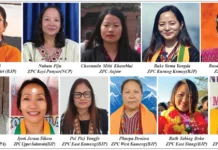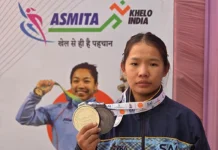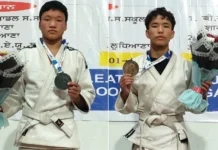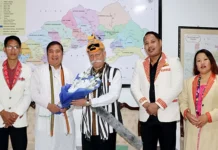[ Bingam Gamlin, Tenzing T Totpa & Ponung Tasing ]
As newly inducted district information and public relations officers (DIPROs), the opportunity to serve is often shrouded in terms of administration and execution. Rarely does one anticipate immediate immersion into the heart of the region’s cultural renaissance. Yet, this was precisely the gift offered by our inclusion in the Information and Public Relations (IPR) Department, headed by Gijum Tali’s team, which was responsible for organising the Arunachal Literary Festival (ALF).
Tasked with contributing to the seamless execution of one of the state’s most significant cultural gatherings, a duty perfectly aligning with our mandate to manage public narrative, this experience rapidly evolved from a professional duty into a profound exercise in cultural coordination, grassroots logistics, and personal growth.
Set against the stunning backdrop of DK Convention Hall, the festival was a vibrant nexus of ideas, languages, and identities, and our role was a privileged vantage point from which to witness and facilitate this convergence. This report documents the unique blend of organisational challenges, intellectual stimulation, and cultural awakening that defined our time as proud members of the ALF team.
Day 1: The organisational crucible and grand commencement
The initial phase immediately placed us in the organisational crucible. Guiding the overall operation was our nodal officer Higio Zarngam, whose calm but decisive leadership proved instrumental. Our primary functional responsibility was the writing and dissemination of press releases, a team efficiently headed by Purabi Taikam.
The intense organisational work culminated in the formal inauguration ceremony. Immediately following the formalities, a major personal perk occurred as the dignitaries visited the stalls. As they toured the book stall near Pakke Hall, we got the chance to meet the celebrated author and Padmashree recipient, Mamang Dai, and get her books signed. This direct engagement with a literary giant provided instant inspiration as we prepared for the rest of the festival.
The evening concluded with a celebratory dinner party, where all the esteemed delegates and dignitaries were formally felicitated by our esteemed Secretary Nyali Ete. The atmosphere of genuine camaraderie was profoundly amplified by unexpected artistic contributions from the senior leadership. Chief Secretary Manish Kumar Gupta presented a beautiful song, and remarkably, the commissioner to the CM, Sonam Chombay, also performed, playing the guitar with the energy of a true rock star.
This formal commencement marked the pivot point from planning to vibrant exchange.
Day 2: Accountability, press triumphs, and intellectual exchange
The second day brought an immediate lesson in the rigorous discipline required for such an event. Despite the positive momentum from the previous night, a lapse in timing saw us arrive fifteen minutes late, leading to a crucial reality check from our liaisoning officer Ramar Jokik. This incident underscored the absolute imperative of punctuality and preparedness.
However, the subsequent moment of validation provided the necessary fuel, which was seeing our very first official press release about the previous day, detailing the grand inauguration, published across media outlets and this cheered us up instantly and kept us fully engaged and focused the entire day.
Intellectually, this was the core of the festival. We witnessed a vibrant tapestry of voices, where sessions seamlessly wove together national and international literary figures with the vital voices of local indigenous storytellers and poets. The focus on affirming identity, such as a session dedicated to the origins of Abotani, demonstrated that literature and art are the region’s most potent connective tissue.
The day’s intense literary discourse translated into high-stakes communication demands, and the work culminated late in the evening when each of us compiled our notes to prepare the final press release for the day, which was duly and rigorously verified by our guide.
Day 3: Discipline, outreach, and operational closure
The final day served as the ultimate test of the discipline instilled, as we arrived sharp on time, transitioning immediately into a new, heartening environment: the Children’s Corner. This vital space, expertly guided by Romar Jokik, represented the festival’s long-term investment in the future of Arunachal’s literary culture. Our focus here was on facilitation, witnessing the pure, unfiltered joy of young engagement, which was a powerful reminder of how cultural events bridge bureaucratic action with grassroots enrichment.
The intensity of the final day led to the ultimate operational close. Driven by sheer commitment, and fuelled by countless cups of coffee and a stomach full of the inevitable festival gas, we gathered one last time in the Namdhapa Hall. We pooled the final notes and concluding statements to draft what would be our final press release for the festival.
This last collaborative act, distilling the entire three-day kaleidoscope of culture, ideas, and logistics into a concise, official narrative, marked the true end of our organisational duty.
Impact and lasting impression
The Arunachal Literary Festival proved to be a powerful and immediate lesson in discovery. Our time at ALF solidified a fundamental realisation that literature and art are not peripheral to governance. The seamless, cooperative effort between various government departments and cultural organisations was a masterclass in collaboration that we will carry into all our future administrative roles.
The experience was defined by a productive duality: the intense, high-pressure execution required to manage a large-scale event, and the profound, quiet discovery of the cultural heart of the region. Moving forward, we are not only more skilled officers, adept at logistics and strategic communication, but also a more deeply committed advocate of change, determined to support the cultural initiatives that empower communities and ensure that the vital, diverse narratives of Arunachal Pradesh continue to be heard, celebrated, and preserved. (DIPR)




